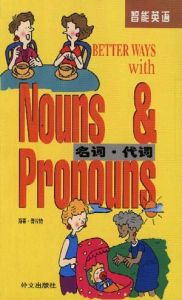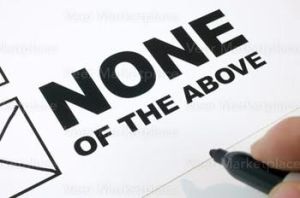概念
不定代詞是不指明代替任何特定名詞或形容詞的代詞,英語中不定代詞有:some(something,somebody,someone),any(anything,anybody,anyone), no(nothing,nobody,no one), every(everything,everybody,everyone),all,each,both,much,many,(a)little,(a)few,other(s),another,none,one,either, neither等。作用
作主語
 不定代詞
不定代詞Both(of us) are right.
(我們)兩人都對。
Either(of the answers) is correct.
兩個回答不論哪一個都對。
Neither(of the answers) is correct.
兩個回答哪一個都不對。
Is everybody here?
大家都到了嗎?
Nothing special happened yesterday.
昨天沒有發生什麼特殊的事情.
All is going well.
一切進行得很好。
作賓語
例:
There is room for all of us.
我們所有的人全坐得下。
He gave two to each(of them).
他給(他們)每人兩個。
I like none of the books.
這些書我全不喜歡。
If you have any, give us some.
有的話,給我們一點。
作表語
例:
That’s nothing.
沒什麼。
Is that all you want to know?
你想知道的就是這些嗎?
Thanks, it’s too much for me.
謝謝,太多了。
I’m not somebody,I’m nobody.
我不是重要人物,我是個無名小卒.
That’s really something.
那真是一大收穫。
作定語
例:
You may take either road.
兩條路你走哪條都行。
Every room is clean and tidy.
每一個房間都很整潔。
Everybody’s business is nobody’s business.人人都管等於沒人管。(諺)
Where are the other students?
其他的學生在哪裡?
Please give another example to illustrate your point.請再舉個例子來說明你的論點。
作同位語
例:
They both agreed to stay here.
他們兩人都答應待在這兒。
We are all for him.
我們全支持他。
We none of us said anything.
我們誰也沒說什麼。
Give them two each.
給他們每人兩個。
用法比較
all,every和each
all在表示抽象的整體概念時,作單數,相當於everything(一切東西),例:
All was destroyed in the big fire.
大火中一切都毀了。
Grasp all, lose all.
什麼都抓,什麼都抓不住。(諺)
Is that all you Want to know?
你想知道的就這些嗎?
all指人時用作複數,意為指三者以上的“全部”、“全體”,相當於everyone(每個),例:
All are present.
大家都出席了。
There is room for all of us.
我們所有的人全坐得下。
SHE KNOWS us all.
她認識我們所有的人。
all在人稱代詞前面,只能用all of,而且要與人稱代詞的賓格us, you, them等連用,如:all of us,而不能說成all us。
every用於三個或三個以上的人或物,是“每一個”的意思,只能作定語,強調整體概念,例:
Every player is present.
每個運動員都出場了。
They helped us in every way.
他們從各方面幫助我們。
在表示“每個”、“全體”意思時,every的意思與all很接近。但一般情況下every和單數名詞搭配,all和複數名詞搭配,例:
Every child enjoys Christmas.
每個孩子都喜歡過聖誕節。
All children enjoy Christmas.
所有的孩子都喜歡過聖誕節。
Each也是“每一個”的意思,但與every不同,each用於指兩個或兩個以上的人或物,著重於個別概念,例:
Two men came into the room. Each carried an umbrella.
兩個人走進房間,每人拿著一把傘。
Each book on this desk is worth reading.
這桌子上每一本書都值得讀。
He gave three to each(of them).
他給(他們)每人三個。
some和any
不定代詞some,any都是“一些”的意思,都可和可數名詞或不可數名詞連用。some一般用於肯定句中;而any則用於否定句、疑問句或條件從句中,例:
Tom has some picture-books.
湯姆有幾本圖畫書。
I have waited some time.
我已等了一會兒了。
Have you any questions?
你有問題嗎?
There aren’t any pictures on the wall.
牆上沒有圖片。
If there are any new magazines in the library, take
some for me.
如果圖書館來了新雜誌,替我借幾本。
注意:在表示請求或建議,希望得到肯定回答的疑問句中,套用 some而不用 any,例:
Would you please give me some paper?
請你給我一些紙張好嗎?
Would you like some sugar?
你要點糖嗎?(=給你一些糖好嗎?)
some還可用於盼望得到肯定答覆的疑問句,如:
Isn’t there some ink in that bottle?
那個瓶不是還有點墨水嗎?
當any表示“任何”或“無論哪一個”的意義時,可用於肯定句,此時any要重讀,例:
Any one will do.
任何一個都行。
You may come at any time that is convenient to you.
你可以在對你方便的任何時候來。
some, any和 body, one, thing構成合成代詞 somebody,someone, something, anybody, anyone, anything等和 some,any的基本用法一樣,由some構成的合成代詞一般用於肯定句,由any構成的合成代詞一般用於否定句和疑問句。
如果要在疑問句中表示請求,建議等肯定的意思或者盼望得到肯定的答覆,須用somebody,someone或something。
many、much和 few、little
many(很多), few(很少), a few(有幾個)是表示數的代詞,用以代替或修飾可數名詞; much(很多),little(很少), a little(有一些)是表示量的代詞,用以代替或修飾不可數名詞。 a few和 a little表示肯定的意義,而 few和little
則表示否定意義。這些詞一般作定語時較多,有時也可作主語、賓語,例:
She has as many books as you.
她擁有與你同樣多的書。(定語)
I have few books to lend you.
我幾乎沒書可借給你。(定語)
My mother had a little money on her.
我媽媽身邊有點兒錢。(定語)
Many have come to the meeting.
許多人已來開會。(主語)
There is little left.
沒剩多少了(主語)。
He knows little about it.
這事他不太了解。(賓語)
How much is it?
多少錢?(表語)
注意: a lot(of), plenty of等一類的短語相當於many和much,可修飾可數或不可數名詞,一般用於肯定句,例:
She has a lot of books on this subject.
她有許多關於這個課題的書。
other(s),the other和another
other表示“另一個”的意思,在句中可作主語、賓語或定語,不獨立使用,通常修飾可數名詞複數。其複數形式是others,可獨立使用,無範圍限定。other和others前面加定冠詞the時是特指,表示兩個中的一個;前面不帶定冠詞the時,表示泛指,例:
I have two brothers.One is a doctor,the other is a teacher.
我有兩個兄弟。一個是醫生,另一個是教師。(特指,作主語)
He is always ready to help others.
他總是樂意幫助別人。(泛指,作賓語)
Five of them are in the classroom.What about the others?
他們中有五個人在教室里。其餘的人呢?(特指,作賓語)
another(另外一個,又一個)只能代替或修飾單數名詞,可用作主語、賓語或定語,不獨立使用。它實際上是由an+other構成的,因此前面不可再用冠詞,即不定指。例:
Don’t lose heart.Have another try.
別灰心,再試一次。(作定語)
I have got three English novels.One is written
by Charles Dickens,another(is written)by Mark
Twain,and the third(is written)by Bronte.
我有三本英語小說。一本是查爾·狄更斯寫的,另一本是馬克·吐溫寫的,還有一本是布朗蒂寫的。(作主語)
another後面還可以跟few 或帶數字的複數名詞,例:
Just think what our town will be like in another few years.
構想一下,再過幾年我們這個城市將是什麼樣子。
You’d better stay in bed for another two weeks.
你最好再臥床二周。
none,nothing和noone
 不定代詞
不定代詞“Haveyouboughtanyclothes?”“None.”
“你買衣服了嗎?”“一件沒買。”
“Didanyonecometoseeme?”“Noone.”
“有人來看我嗎?”“一個人也沒有。”
“Arethereanybirdsinthetreenow?”“None.”
“現在樹上有鳥嗎?”“一隻也沒有。”
“Whatisinthebag?”“Nothing”
“袋子裡有什麼?”“什麼也沒有。
舉例
一般不定代詞用法例子
1.some一些,某些,某個
不定代詞some可以代替名詞和形容詞,常用在肯定句中作主語、賓語、定語等。作定語時,它可以修飾可數名詞(單、複數皆可)和不可數名詞。例如:
somearedoctors,somearenurses.有些人是醫生,有些人是護士。(作主語)
2.any一些,任何
不定代詞any可以代替名詞和形容詞,常用在否定句或疑問句中作主語、賓語、定語等。作定語時,它可以修飾可數名詞(多為複數)和不可數名詞。例如:
thereisn’tanyinkinmypen.我的鋼筆沒有墨水。(作定語)
不定代詞any有時也可以用在肯定句中,表示"任何的"。例如:
youmaycomeatanytime;i’llbehomethewholeday.你任何時候來都行,我整天都將呆在家裡。
不定代詞any也可以用作副詞,做狀語,表示程度。例如:
isheanybettertoday?他今天好一點了嗎?
3.all全體,所有(指三者以上)
不定代詞all在句中可以作主語、賓語、表語、定語或同位語。它可以代表或修飾可數名詞和不可數名詞。代表或修飾可數名詞時,指兩個以上的人或物。作先行詞時,引導詞用that。例如:
Allwerepresentatthemeeting.全都到會了。(作主語,代表可數名詞)
4.both全部,都
不定代詞both指兩個人或事物。和all一樣,可以用作主語、賓語、定語或同位語。例如:
weinvitedbothtocometoourfarm.我們邀請兩個人都來我們的農場?(作賓語)
5.none無人或無
不定代詞none的含義和all物相反,和noone,notany同義,但其用法相當於名詞,在句子中一般作主語或賓語。它代替不可數名詞作主語時,謂語動詞用單數形式;代替可數名詞作主語時,謂語動詞用單、複數皆可。例如:
noneoftheproblemsis/areeasytosolve.這些問題沒有一個是容易解決的。(作主語,代替可數名詞)
6.either兩者之中的任何一個,這個或那個。
不定代詞either可以作主語、賓語和定語。例如:
eitherofthemwillagreetothisarrangment.他們兩人中會有人同意這樣的安排的。(作主語)
7.neither兩者都不
不定代詞neither是either的否定形式,可以作主語、賓語和定語。例如:
neitherisinteresting.兩個都沒有趣。(作主語)
8.each每個,各自的
不定代詞each指每一個人或事物的個別情況,甚至指這些個別情況各不相同。它在句中可以作主語、賓語、定語和同位語。例如:
shegavethechildrentwoappleseach.她給了每個小孩兩個蘋果。(作thechildren的同位語。)
9.every每個,每一的,一切的
不定代詞every有"全體"的意思,和all的意義相近,但只能作定語。
複合不定代詞
1.some,any,every,no都能和one,body,thing一起構成代詞,這些代詞叫複合不定代詞。它們基本含義為:指人somebody
someone某人
anybody、anyone:任何人
everybody、everyone:每人
nobody、noone:沒人
指物Something某物某事anything任何事物everything一切nothing沒東西
2.一般情況下,some構成的複合不定代詞,其作用和some相同,用於肯定句;any構成的複合不定代詞用於否定句或疑問句;no構成的複合不定代詞表示否定含義,用於否定句。如:
①Ihavesomethingtotellyou.我有事要告訴你。
②Hedidn’tsayanythingatthemeetingyesterday.昨天在會上他沒發言。
③Everybodylikesswimming.每個人都喜歡游泳。
④Thereisnothingwrongwithyourears.
你耳朵沒毛病。
3.something可用於提建議或請求的問句中,以及希望說話對方作出肯定回答的問句中。如:
Wouldyoulikesomethingtoeat?你要吃點東西嗎?
4.複合不定代詞在句子中作主語時,謂語動詞一般用單數形式。如:
Nobodyknowshisname.沒有人知道他的名字。
5.不定代詞的定語要後置。如:
Isthereanythingimportantintoday’snewspaper?今天的報紙上有什麼重要新聞嗎?
一般的,不定代詞(包括複合不定代詞)在句子中,通常用第三人稱單數形式
6。複合不定代詞的否定。
1、“notevery-”表示的是部分否定,意為“並非都,不都”。例如:
Noteverythingwillgowell.並非一切都會那么順利。
Theteacherdidn’tcalleveryone’sname.老師並沒有點所有人的名。
2、“notany-”和no-均表示全否定。例如:
Helistened,butheardnothing.他聽了聽,但什麼也沒聽到。
=Helistened,butdidn’thearanything.
Youhaven’tcalledanyone/anybodyup,haveyou?你沒給誰打過電話,是嗎?
=Youhavecallednoone/nobodyup,haveyou?
1.不定式是英語動詞的一種形式。它在許多情況下可省略"to",它不同於漢語動詞,漢語動詞只有一種形式。如:我看書。她看書。但英語要說“看”必須根據主語的人稱,動作發生的時間等確定其形式。如:1)Ireadabook.2)Shereadsabook.1)句中的“read”
是一般現在時第一人稱的動詞定式。2)句中的“reads”是一般現在時第三人稱單數的動詞定式。
Iwanttoreadabook./Shewantstoreadabook.
我想要看書。她想要看書。其中的“看”不易確定其形式。因為動作還未發生,因此稱不定式。通俗的說,就是“不一定是什麼形式”
2.不定代詞是不指明代替任何特定名詞或形容詞的代詞,英語中不定代詞有:some(something,somebody,someone),any(anything,anybody,anyone),no(nothing,nobody,noone),every(everything,everybody,everyone),all,each,both,much,many,(a)little,(a)few,other(s),another,none,one,either,neither等。
1)陳述部分的主語是I,疑問部分要用aren'tI.
I'mastallasyoursister,aren'tI?
2)陳述部分的謂語是wish,疑問部分要用may+主語。
Iwishtohaveawordwithyou,mayI?
3)陳述部分用no,nothing,nobody,never,few,seldom,hardly,rarely,little等否定含義的詞時,疑問部分用肯定含義。
TheSwedemadenoanswer,didhe/she?
Someplantsneverblown(開花),dothey?
4)含有oughtto的反意疑問句,陳述部分是肯定的,疑問部分用shouldn't/oughtn't+主語。
Heoughttoknowwhattodo,oughtn'the?/shouldn'the?
5)陳述部分有haveto+v.(hadto+v.),疑問部分常用don't+主語(didn't+主語)。
Wehavetogetthereateighttomorrow,don'twe?
6)陳述部分的謂語是usedto時,疑問部分用didn't+主語或usedn't+主語。
Heusedtotakepicturesthere,didn'the?/usedn'the?
7)陳述部分有hadbetter+v.疑問句部分用hadn'tyou?
You'dbetterreaditbyyourself,hadn'tyou?
8)陳述部分有wouldrather+v.,疑問部分多用wouldn't+主語。
Hewouldratherreadittentimesthanreciteit,wouldn'the?
9)陳述部分有You'dliketo+v.疑問部分用wouldn't+主語。
You'dliketogowithme,wouldn'tyou?
10)陳述部分有must的疑問句,疑問部分根據實際情況而定。
Hemustbeadoctor,isn'the?
YoumusthavestudiedEnglishforthreeyears,haven'tyou?/didn'tyou?
Hemusthavefinishedityesterday,didn'the?
11)感嘆句中,疑問部分用be+主語。
Whatcolours,aren'tthey?
Whatasmell,isn'tit?
12)陳述部分由neither…nor,either…or連線的並列主語時,疑問部分根據其實際邏輯意義而定。
NeitheryounorIamengineer,arewe?
13)陳述部分主語是指示代詞或不定代詞everything,that,nothing,this,疑問部分主語用it。
Everythingisready,isn'tit?
14)陳述部分為主語從句或並列複合句,疑問部分有三種情況:
a.並列複合句疑問部分,謂語動詞根據鄰近從句的謂語而定。
Mr.SmithhadbeentoBeijingforseveraltimes,heshouldhavebeeninChinanow,shouldn'the?
b.帶有定語從句,賓語從句的主從複合句,疑問部分謂語根據主句的謂語而定:
Heisnotthemanwhogaveusatalk,ishe?
HesaidhewantedtovisitJapan,didn'the?
c.上述部分主句謂語是think,believe,expect,suppose,imagine等引導的定語從句,疑問部分與賓語從句相對應構成反意疑問句。
Idon'tthinkheisbright,ishe?
Webelieveshecandoitbetter,can'tshe?
15)陳述部分主語是不定代詞everybody,anyone,somebody,nobody,noone等,疑問部分常用複數they,有時也用單數he。
Thisisournewheadmaster,isn’tit?
ThoseareJapanese,aren’tthey?
Oneshouldbereadytohelpothers,shouldn’tone?
Onecan’tbetoocareful,canyou?
Eachofthestudentshasadictionary,hasn’the?
Eachofthestudentspassedtheexamination,didn’tthey?
Noneofhismoneyisleft,isit?
Noneofhisfriendsareinterested,arethey?
Noneofhisfriendshascome,hashe?
Somethingwillhavetobedoneabouttheprice,won’tit?
Everybodyiskindtoyou,aren’tthey?
Noonelefthereyesterday,didthey?
Someoneturnedthatradiodown,don’tthey?
Neithersidecouldwin,couldthey?
Everythingthathesaysisfalse,isn’tit?
Iamolderthanyou,aren’tI/ain’tI?
Iamworkingnow,ain’tI/amInot?
Iwishtoseethemovienow,mayI?
IwishIwereyou,mayI?
16)帶情態動詞dare或need的反意疑問句,疑問部分常用need(dare)+主語。
Weneednotdoitagain,needwe?
Hedarenotsayso,dareyou?
當dare,need為實義動詞時,疑問部分用助動詞do+主語。
Shedoesn'tdaretogohomealone,doesshe?
17)省去主語的祈使句的反意疑問句,疑問部分用willyou。
Don'tdothatagain,willyou?
Gowithme,willyou/won'tyou?
注意:Let's開頭的祈使句,後用shallwe?
Letus開頭的祈使句,後用willyou?
Let'sgoandlistentothemusic,shallwe?
Letuswaitforyouinthereading-room,willyou?
18)陳述部分是"therebe"結構的,疑問部分用there省略主語代詞。
Thereissomethingwrongwithyourwatch,isn'tthere?
Therewillnotbeanytrouble,willthere?
19)否定前綴不能視為否定詞,其反意疑問句仍用否定形式。
Itisimpossible,isn'tit?
Heisnotunkindtohisclassmates,ishe?
20)must在表"推測"時,根據其推測的情況來確定反意疑問句。
Hemustbetherenow,isn'the?
Itmustbegoingtoraintomorrow,won'tit?
快速記憶表
陳述部分的謂語疑問部分
Iaren'tI
Wishmay+主語
no,nothing,nobody,never,
few,seldom,hardly,肯定含義
rarely,little等否定
含義的詞
oughtto(肯定的)shouldn't/oughtn't+主語
haveto+v.(hadto+v.)don't+主語(didn't+主語)
usedtodidn't+主語或usedn't+主語
hadbetter+v.hadn'tyou
wouldrather+v.wouldn't+主語
you'dliketo+v.wouldn't+主語
must根據實際情況而定
感嘆句中be+主語
Neither…nor,
either…or連線的根據其實際邏輯意義而定
並列主語
指示代詞或不定代詞
everything,that,主語用it
nothing,this
並列複合句謂語根據鄰近從句的謂語而定
定語從句,賓語從句的
主從複合句根據主句的謂語而定
think,believe,expect,
suppose,imagine等引導與賓語從句相對應的從句
everybody,anyone,
somebody,nobody,noone複數they,單數he
情態動詞dare或needneed(dare)+主語
dare,need為實義動詞do+主語
省去主語的祈使句willyou?
Let's開頭的祈使句Shallwe?
Letus開頭的祈使句Willyou?
therebe相應的謂語動詞+there(省略主語代詞)
否定前綴不能視為否定詞仍用否定形式
must表"推測"根據其推測的情況來確定反意疑問句

